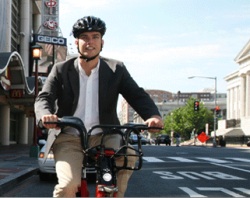After being mum on bike-sharing for about 18 months, the City of Portland Bureau of Transportation has now taken the idea back off the shelf.
At a meeting of the City’s Bicycle Advisory Committee last night, PBOT shared plans for a bike-sharing system that would blanket the Central City with 74 kiosks and 750 bikes.
The plan came up during a discussion of which projects the City of Portland will look to fund with their allocation — expected to be anywhere from 3 to 5 million — from about $18 million in federal Regional Flexible Funds (RFF) that Metro will hand out specifically to “Active Transportation” projects (I’ll share more about the other projects in a separate post).
According to Steve Hoyt-McBeth, Transportion Options Division staffer who has been managing the bike-sharing project for PBOT, the 750 bikes would serve the completed Portland Streetcar Central Loop — which encompasses Portland’s Central Business District, PSU, South Waterfront, the Central Eastside, Lloyd, Rose Quarter, Pearl/Old Town, Alphabet, and West End districts.
“The Mayor’s office has been clear all along that bike-sharing in Portland must be a public/private partnership… that’s why our plan is predicated on bringing private funding to the table.”
— Steve Hoyt-McBeth, PBOT
The Central City Bike Share plan would cost about $4 million to get up and running and $1 million annually to operate. The annual operations costs would be borne entirely from user fees (the system would have a nominal annual membership cost) and sponsorship from private companies and organizations. Essentially, once the start-up costs are paid for, the system would be financially self-sustaining.
Hoyt-McBeth says he is fully aware that without private investment the plan is a “non-starter.” “The Mayor’s office has been clear all along that bike-sharing in Portland must be a public/private partnership… that’s why our plan is predicated on bringing private funding to the table.” Hoyt-McBeth and his team are already in discussions with several partners interested in making the Central City Bike Share system a reality (Minneapolis, Denver, and Montreal have all raised over $1 million in private funding in their first year).

(Photo: Capital Bikeshare)
The City of Portland has regulations about how advertising can appear in the public right of way. This makes giving return on investment to private sponsors a bit more challenging; but Hoyt-McBeth feels they’ve got room to work within the rules and still give investors some bang for their buck.
The system itself would also show a quick return in terms of impact on our transportation system, Hoyt-McBeth says. He offers a very conservative estimate of 100,000 new bicycle trips in the first year of operation and 500,000 trips in the first two years. “I think that’s a pretty impressive leverage of a federal grant.”
A project description developed by PBOT, says that, once active, the proposed bike-sharing system “will result in a fully functional, complete active transportation asset that has the potential to significantly reduce single occupancy motor vehicle trips and increase the number of bicycle trips.”
In making the case for the Central City Bike Share project, PBOT points out that this area is the city’s most dense and contains 100,000 jobs and about 35,000 to 50,000 residents. In addition, 2009 Census data shows that 40% of the households in the are earn $30,000 or less per year (equity to underserved populations is a key criteria for the Metro RFF money).
Also pushing hard for this project is the Bicycle Transportation Alliance. BTA Executive Director Rob Sadowsky, currently in Washington DC for a meeting with national advocacy leaders, emailed this morning to say they feel, “bike sharing is a cost effective way to increase mode share and can work very well in Portland.” The BTA has been at the table for stakeholder meetings where interest has been shown in the project from representatives of Portland Streetcar Inc, the Portland Sustainability Institute, and the Mayor’s Office.
Keep in mind, this isn’t the only project PBOT is considering for funding with their flexible fund money. Other projects in the running include a portion of the Sullivan’s Gulch Trail, a host of bikeway improvements for East Portland, and others.
Since Transportation Commissioner (now Mayor) Sam Adams first pushed for bike-sharing in Portland nearly four years ago, several other U.S. cities have proven that such systems work. Minneapolis, Denver, and Washington D.C. have all enjoyed successful roll-outs and now — with what Hoyt-McBeth refers to as a “perfect” funding opportunity to start it up — it seems as though Portland is once again bullish on the idea.
Back in May of 2010, the Chief of Staff for Mayor Adams Tom Miller (who’s been named Director of PBOT) made it clear that Portland was waiting for the right business model and a clear U.S. success before moving forward. Both of those conditions have now been met.
We’ll keep you posted on the status of the RFF funding. Without it, Hoyt-McBeth says they’ll have to, “go back to the drawing board.”
— Learn more about Portland’s efforts to develop a bike-sharing system in our six-part series written for BikePortland by incoming PBOT Director Tom Miller. Also, browse our bike-sharing archives.



